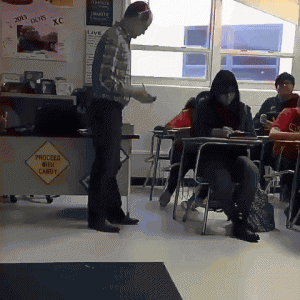I have to confess that I had to look up who Alfred Mercier, the owner of this quote, was. And I say “was” because although this inspirational poet was born at the beginning of the XIXc., he is very much in line with my way of thinking: “what we learn with pleasure, we never forget”.
This has always been my aim: to teach trying to make my lessons memorable for my students. Sometimes I succeed, sometimes I don’t. But I am always trying. Anyway, I really believe the first five minutes of the class, mark its rhythm and that the way you present the information to students is of the utmost importance.

This lesson for C1 students focuses on education. It offers practice in the following:
- vocabulary
- listening
- speaking
- reading
Warm-up: What's the weirdest thing your teacher has done?
So, let’s start with some fun. On the board, write the word Weird and drill pronunciation. Show them the gif for a bit of fun and display or read some of the tweets sent to Jimmy Fallon’s hashtag game #MyWeirdTeacher. Here’s the link. I think my fav is Number 1. That’s the one I would give my students as an example.
Ask the question: What’s the weirdest thing your teacher has done?. Give them some thinking time and listen to their stories.
Revising vocabulary
For a student, learning new vocabulary can be a bit overwhelming so it’s always a good idea to tap into students’ knowledge. It really helps make learning new words much easier. The method or activity used to extract previous knowledge should differ from the one used to teach new content using more dynamic strategies to work with the former.
A simple activity could be giving students 1 minute to write down as many topic-related words as they can remember, emphasizing words such as “teacher” or ” primary school” are not adequate for this level and will be dismissed. I will be using Mentimeter for this activity but feel free to use the familiar pen and paper. The prize for the winner? a round of applause- we are suffering cuts in the school budget 🙂
Speaking and Writing: Small activities
Change one thing: If I could change one thing about the past school year…
Six adjectives: use 6 adjectives to describe your last academic year
What advice would you give to someone who is beginning to learn English?
Listening: What makes a good teacher? What makes a good student?
Pre-listening:
a. Give students some thinking time to come up with their ideas of what, in their opinion, makes a good teacher. This is a good opportunity to introduce vocabulary they will find in the video.
b. At the same time, ask them to write 3 adjectives that a good teacher needs to possess.
Before playing the video, ask students to read the three adjectives they have written. Play the video once and see whose choice of adjectives are on the video. Play a second and even a third time and ask students to take notes.
Tapescript, here
Repeat procedure for What makes a successful student?
Introducing new vocabulary collaboratively
Give them the list of new words and ask students to underline the words they already know. This is a good way to guarantee you are not going to be the only one doing the work here and they will be engaged throughout the activity. After a couple of minutes, go through the list asking individual students to provide definitions and give examples. Clarify and exemplify any real new words.
Get the PDF here
Drill the pronunciation of…
- creativity
- data
- discipline
- plagiarism
- poem
Speaking Interactive Posters : thumbs up, thumbs down.
Present the students with the following statements, one at a time, and ask them to give a thumbs-up or a thumbs-down to indicate whether they agree or disagree with the statement on display.
Once they have established where they stand, click on the interactive button on the poster, displaying suggested vocabulary they can use when presenting their point of view. Give them one minute to plan what they are going to say. Repeat procedure with all or some of the posters.
Further Practice. Homework
- Reading: the UK education system, the Spanish education system
- Reading: Bad education? Why more class time has not improved academic results in Spain
- Further listening practice is provided by the free website TedED, which I highly recommend. If students want to take it at home, they will need to register but it is completely free. In this case, I have chosen the video Should we get rid of standardized tests? which comes with some comprehension questions
